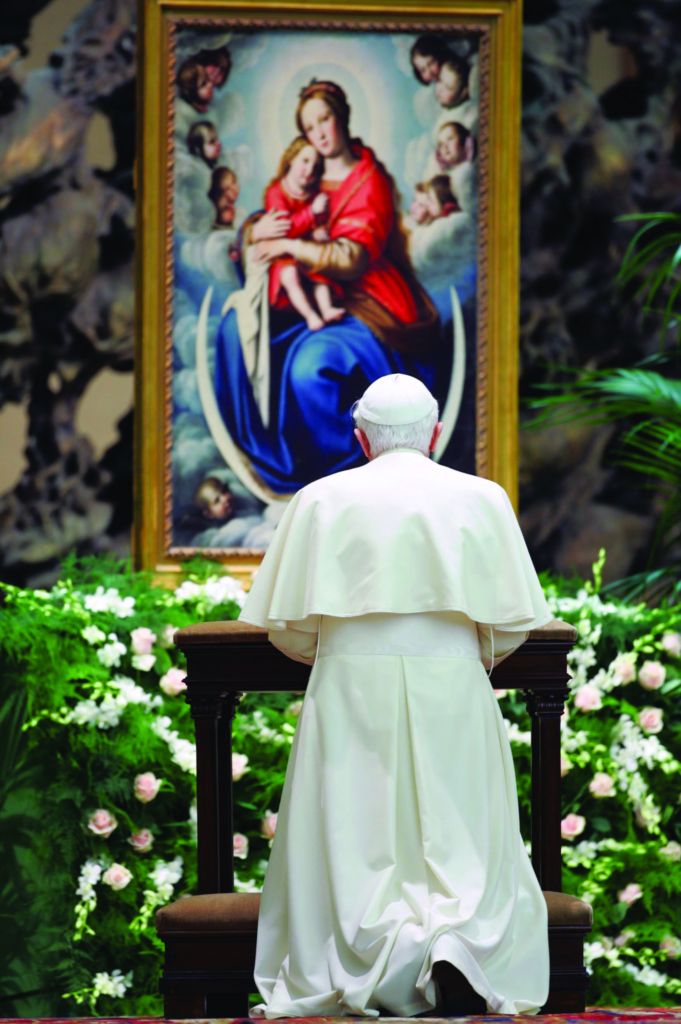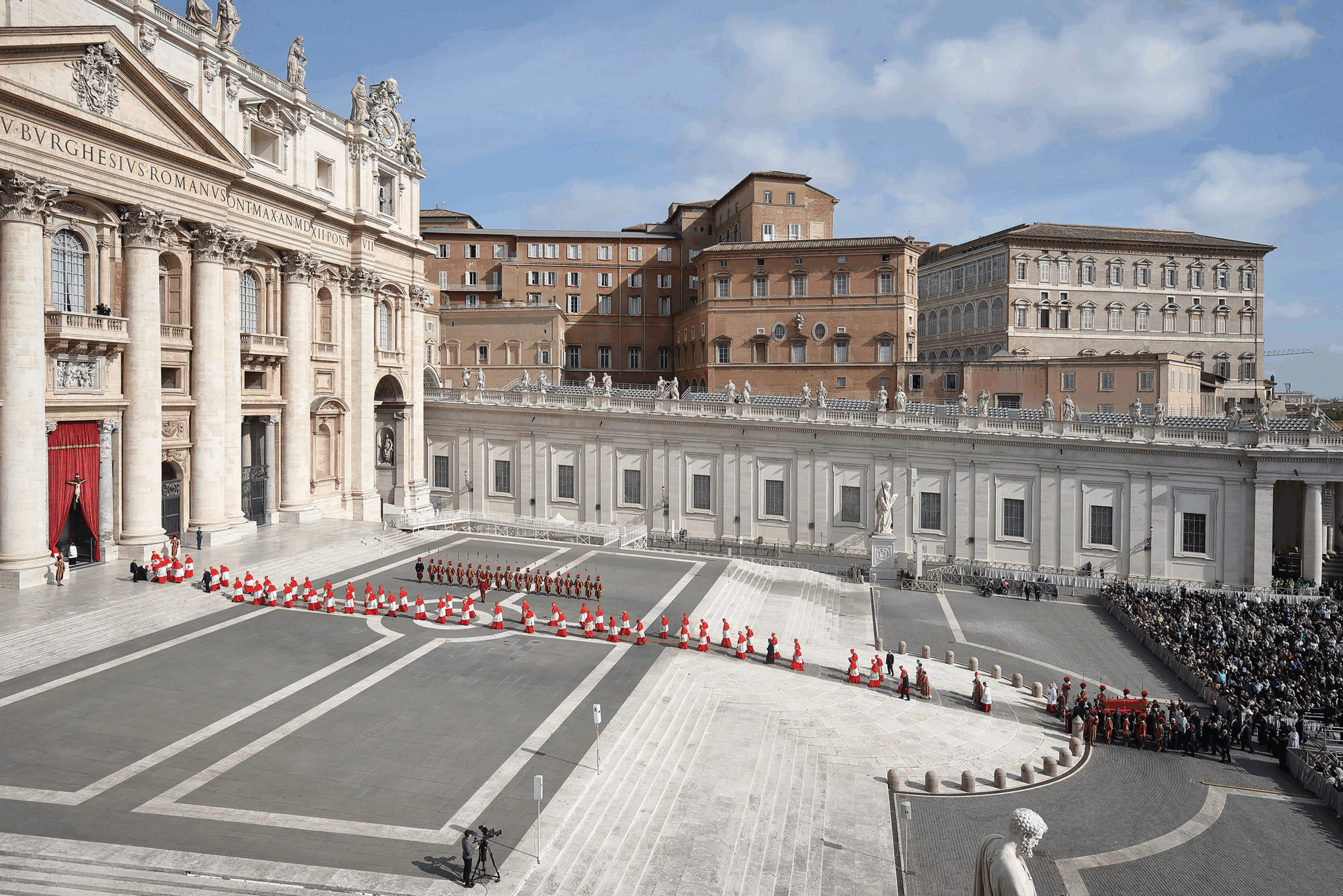Correct Marian devotion shows “the coexistence of indispensable ‘reason’ with the equally indispensable ‘reasons of the heart'”
By Robert Fastiggi, Ph.D.

If we were to list the great Marian Popes, we might include pontiffs like Bl. Pius IX, who defined the dogma of the Immaculate Conception, or Leo XIII, who issued twelve encyclicals on the Rosary. We might also include Pius XII, who defined the dogma of the Assumption, or St. John Paul II and his extensive Marian corpus. Joseph Ratzinger/Benedict XVI, however, should also be considered a Marian Pope, though this might not be evident to many people. In an article entitled, “Mary, ‘Personal Concretization of the Church’: Elements of Benedict XVI’s Marian Thinking” (Marian Studies Vol. 57, 2006), Fr. Johann Roten, SM, provides a comprehensive list of publications of Joseph Ratzinger with a Marian aspect from 1961–2000.
Although Joseph Ratzinger never published a treatise on Mariology, two books have been published that synthesize his Marian vision. The first is Daughter Zion: Meditations on the Church’s Marian Belief, which was translated by J. Michael McDermott, SJ, and published by Ignatius Press in 1983. This book is based on three lectures given by Fr. Joseph Ratzinger in the spring of 1975, and it shows the Virgin Mary’s central role in Scripture as a type of bridge between the Old and New Testaments. The second book is Mary, the Church at the Source, which was translated by Adrian Walker and published by Ignatius Press in 2005. This book is a compilation of significant articles of Joseph Ratzinger and Hans Urs von Balthasar on the Virgin Mary. The five texts of Ratzinger cover some important themes such as “the place of Mariology in the whole of theology”; “Marian piety”; and Mary, “the sign of the woman.” For Ratzinger, like von Balthasar, it’s essential to understand the Marian profile of the Church.
There have also been two recent books that provide key insights on the Marian vision of Joseph Ratzinger/Benedict XVI. The first is Innovation within Tradition: Joseph Ratzinger and Reading the Women of Scripture by Mary Frances McKenna (Fortress Press, 2015). In this book, McKenna shows how Ratzinger highlights the central role of women in the Bible and salvation history. The Blessed Virgin Mary is the supreme embodiment of this female line of Scripture. Mary’s “yes” to be the Mother of the Word Incarnate shows that “it is through Jesus and Mary” that sin, which “negatively affects humanity, is overcome.”
The second recent book is Mary, Daughter Zion: An Introduction to the Mariology of Joseph Ratzinger (Benedict XVI) published by Peter Lang in 2022. Written by Fr. Martin Ifeanyi Onuoha of Nigeria, this volume provides a detailed analysis of Joseph Ratzinger’s vision of Mary in the Old Testament, the Infancy narratives, the New Testament as a whole, and in the Marian dogmas. Like Dr. McKenna, Fr. Onuoha points to how Mary’s “yes” is central to the Marian vision of Joseph Ratzinger/Benedict XVI. This emphasis on the “yes” of Mary is evident in Cardinal Ratzinger’s June 26, 2000 Theological Commentary on the Message of Fatima: • I would like finally to mention another key expression of the “secret” which has become justly famous: “My Immaculate Heart will triumph.” What does this mean? The Heart open to God, purified by contemplation of God, is stronger than guns and weapons of every kind. The fiat of Mary, the word of her heart, has changed the history of the world, because it brought the Savior into the world – because, thanks to her Yes, God could become man in our world and remains so for all time.
The “yes” of Mary is so important to Joseph Ratzinger because his theological vision is supremely Incarnational. Out of this Incarnational/Christocentric vision there emerges a Mariology that is Scriptural, Patristic, Liturgical, and Ecclesiological. In his interview with Vittorio Messori, published as The Ratzinger Report (Ignatius Press, 1985), Cardinal Ratzinger lists six points for understanding “the importance of Mary with regard to the equilibrium and completeness of the Catholic Faith:” 1) The place assigned to Mary by dogma and tradition helps to root us in solid Christology. 2) The Mariology of the Church shows the right relationship between Scripture and tradition. The four Marian dogmas—Mother of God, Ever-Virgin, Immaculate Conception, and Assumption—have their clear foundation in Scripture, but “it is there like a seed that grows and bears fruit in the life of tradition, just as it finds expression in the liturgy, in the perception of the believing people and in the reflection of theology guided by the Magisterium.” 3) As a Jewish girl who becomes the Mother of the Messiah, “Mary binds together, in a living and indissoluble way, the old and the new People of God, Israel, and Christianity, synagogue and church.” 4) Correct Marian devotion shows “the coexistence of indispensable ‘reason’ with the equally indispensable ‘reasons of the heart,’ as Pascal would say.” The contemplation of the surpassing dignity of the Mother of God “assures faith its full human dimension.” 5) Mary is “figure,” “image” and “model” of the Church.” Without Mary, theology can “reduce faith to an abstraction,” and “an abstraction does not need a Mother.” 6) Mary’s destiny as Virgin and Mother “continues to project a light upon that which the Creator intended for women of every age … through her virginity and her motherhood, the mystery of woman receives a very lofty destiny from which she cannot be torn away …As a creature of courage and obedience she was and still is an example to which every Christian—man and woman—can and should look.”
The Marian vision of Benedict XVI was shaped by Vatican II and St. Paul VI’s proclamation of Mary as “Mother of the Church” in his address at the end of the third session of Vatican II (November 21, 1964). For Benedict XVI, Mary as the “type of the Church” was essential. He was clearly influenced by the renewed interest in this Patristic and medieval theme, which was emerging in the middle of the twentieth century. In his homily of December 8, 2005, Benedict XVI commemorated the fortieth anniversary of the solemn closing of Vatican II. In this homily, he notes that the Council “took place in a Marian setting. It was actually far more than a setting: it was the orientation of its entire process.” He recalls Paul VI’s proclamation of Mary as Mother of the Church, and he says, “Indelibly printed in my memory is the moment when, hearing his words: ‘Mariam Sanctissimam declaramus Matrem Ecclesiae’ — ‘We declare Mary the Most Holy Mother of the Church,’ the Fathers spontaneously rose at once and paid homage to the Mother of God, to our Mother, to the Mother of the Church, with a standing ovation.” He continues by stating that with this title, Paul VI “summed up the Marian teaching of the Council and provided the key to understanding it. … Mary is so interwoven in the great mystery of the Church that she and the Church are inseparable, just as she and Christ are inseparable.”
The intimacy of Mary with the Church was an important theme at Vatican II, especially in chapter eight of Lumen Gentium, the Dogmatic Constitution on the Church. As a theological advisor to Cardinal Frings at Vatican II, Fr. Ratzinger was no doubt present at the August 26–29, 1963 meeting that took place in Fulda, Germany that was attended by Cardinal Frings and various bishops and theologians — mostly from northern Europe. During this meeting, theologians such as the Jesuit Karl Rahner raised objections to the 1962 schema on the Blessed Virgin Mary, which referred to Mary as “Mediatrix of all graces” in the text and “coredemptrix” in two footnotes. In Lumen Gentium 62, Mary is referred to as “Mediatrix” but not “Mediatrix of all graces.” The footnotes referring to Mary as “co-redemptrix” are absent.
Before becoming Pope, Cardinal Ratzinger distanced himself from the Marian title “co-redemptrix” because it departs too much “from the language of Scripture and the Fathers” (see God and the World: A Conversation with Peter Seewald, Ignatius Press, 2000, p. 306). Pope John Paul II, however, had used the title at least six times, but not after 1991. Some believe Cardinal Ratzinger persuaded the Polish Pope to stop using the title and to avoid defining Mary as “Co-redemptrix, Mediatrix of all Graces, and Advocate” as the movement, Vox Populi Mariae Mediatrici, was asking. As Pope, though, Benedict XVI showed himself in favor of recognizing Mary’s universal mediation of grace. In his homily of May 11, 2007 at Campo de Marte, São Paulo, for the canonization of Frei Antônio de Sant’Ana Galvão, he stated that “there is no fruit of grace in the history of salvation that does not have as its necessary instrument the mediation of Our Lady. …” In a January 10, 2013 letter to Archbishop Zimowski—who was representing the Holy See for the celebration of the World Day of the Sick—Benedict XVI commended the mission of the Archbishop by imploring the prayers and intercession of the Immaculate Blessed Virgin Mary, the “Mediatrix of all graces” (Mediatricis omnium gratiarum).
 Robert Fastiggi, Ph.D., is Professor of Dogmatic Theology at Sacred Heart Major Seminary in Detroit, Michigan. He is a former president (2014–2016) of the Mariological Society of America; a member of the theological commission of the International Marian Association; and a member of the Pontifical Marian Academy International.
Robert Fastiggi, Ph.D., is Professor of Dogmatic Theology at Sacred Heart Major Seminary in Detroit, Michigan. He is a former president (2014–2016) of the Mariological Society of America; a member of the theological commission of the International Marian Association; and a member of the Pontifical Marian Academy International.






Facebook Comments